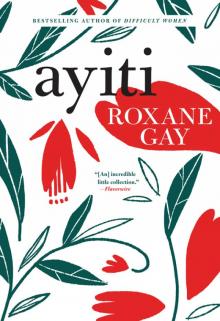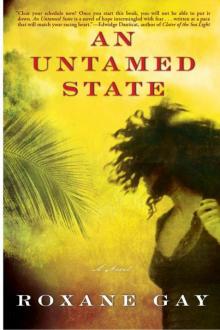- Home
- Roxane Gay
Ayiti Page 6
Ayiti Read online
Page 6
My father prescribed my mother some Valium, and the three of us flew to Port-au-Prince. By the time we landed, my mother was sufficiently sedated. As we disembarked and walked into the terminal, she dreamily asked, “Are we there?” My grandmother and her driver were waiting for us. I inhaled sharply as I saw her for the first time in a decade. She was impossibly small, a frail figure, her dark flesh much looser now, her features hollowed, her white hair swept atop her head in a loose bun. She and my mother stood inches apart and stared at each other. My grandmother took her daughter’s face in her hands, nodded. That night, in our hotel, I heard my mother whisper to my father that she could hardly breathe but for the smell of blood.
After we had spent a few days in the capital helping my grandmother settle her affairs and visiting the headmaster’s grave, she was ready to return to Jacques Bertrand. Despite our demand she stay in the capital or return to the States with us, my grandmother was resolute. We drove across the country to Ouanaminthe on the only passable road. It took hours and by the time we arrived, we were all tired, sweaty, sore, and irritable. Ouanaminthe was not the city it had once been. It was a sad, hopeless place, crumbling buildings everywhere, paint peeling from billboards, the streets crowded with people, each person wanting and needing more than the last. Most of the roads had gone to mud from recent flooding. The air was stifling and pressed down on us uncomfortably. As we stood in the courtyard in front of the small concrete house my grandmother had purchased, men hanging from a passing Tap Tap leered at us. My father stood in front of me, glaring. My mother rubbed her forehead and asked my father for another Valium.
My mother and her mother kept to themselves for the first few days, huddled together, trying to make up for nearly thirty years of separation. There was no room for my father and me in what they needed from one another. On the second night, I went to a local bar where everyone stared as I took a seat. I drank watery rum and Coke until my face and boredom felt numb. I danced to Usher with a man named Innocent. When I sneaked back into my grandmother’s house, I found her sitting in the dark. She nodded to me but said nothing. On the third night, the moon was high and bright, casting its pale light over and through everything. I lay beneath mosquito netting in a tank top and boxers, one arm over my head, one arm across my stomach, my body feeling open and loose. I listened to the sounds of everyone else sleeping. I tried to understand the what and why of where we were.
Just as I was on the verge of drifting asleep, I heard a scratching at the door and sat up, pulling the sheets around me. My grandmother appeared in the doorway. She curled her bent fingers, beckoning. Slowly, I stretched myself out of bed, pulled on a pair of jeans, and flip-flops. I found my grandmother by the front door. My mother was standing next to her, fidgeting, shifting from one foot to the other, clutching at her perfume-scented handkerchief. “What’s wrong?” I asked. My grandmother smiled in the darkness. “Come with us,” she said.
We walked nearly a mile to the banks of the Massacre River, my grandmother pressing her hand against the small of my mother’s back. In the distance, we could see soldiers keeping watch at the checkpoint, their cigarettes punctuating the darkness. I heard hundreds of frightened people who looked like me splashing through the water, searching for safety and then, silence. My grandmother climbed down the damp, steep riverbank, my mother warning her mother to be careful. She waved for us to join her. I slipped out of my sandals, took my mother’s hand, helped her into the river. We stood in a shallow place. I curled my toes in the silt of the riverbed and shivered. I had pictured the river as a wide, yawning, and bloody beast, but where we stood, the river flowed weakly. The waters did not run deep. It was just a border between two geographies of grief.
My grandmother pointed down. The hem of her dressing gown floated around her. “Here,” she said softly.
My mother’s shoulders shook but she made no sound. She gripped my arm. “I cannot breathe,” she said. Then she dropped to her knees, curled into herself. She said, “I must know the truth.”
I knelt behind her. I held her, tried to understand her. I said, “You can breathe.” My grandmother said, “You know the only truth that matters.” Again I heard hundreds of frightened people splashing through the water, keening, reaching for something that could never be reached. The ground beneath us trembled from the heavy footsteps of roving soldiers. I smelled their sweat and their confused, aimless anger.
We knelt there for a long while. My grandmother stood, whispering the story of how she came to know and remember Jacques Bertrand until her words dried on her lips. I stroked my mother’s hair gently, waited for her breathing to slow, her back rising into my chest with a melancholy cadence. We mourned until morning. The sun rose high. Bright beams of light spread over and through us. The sun burned so hot it dried the river itself, turned the water into light. We were left kneeling in a bed of sand and bones. I started crying. I could not stop. I cried to wash us all clean.
Lacrimosa
Marise thought she knew things about tears. When she was a little girl in Port-au-Prince, her father would listen to Mozart’s Requiem while their neighbors danced to konpa and American rock and roll and R & B. Their small two-room home would fill with the melancholy of earnest choral voices and string instruments. Whenever the Lacrimosa sequence began, her father would close his eyes and hold a hand high in the air. Everyone would still. The music was so beautiful Marise knew she was feeling everything that could ever be felt. Then the government was overthrown again and again and again and mouths grew hungry and an even thicker maze of wires began stretching from house to house, each family stealing power from here and there. Walking down alleys, you could no longer see the sky and then it was time for the generators with their loud angry hum making everything thick with the smell of diesel. Her father put the turntable away. There was nothing left to feel.
When the UN soldier first came to her door with his brown skin and baby blue bulletproof vest, he said his name was Carlos Rocha from Veli Velha, Brazil. He held his helmet in the crook of his arm, his long rifle slung over his shoulder. Fat beads of sweat rolled down his face. He had money, a slow lazy grin, and curly black hair. He smiled at her only child. Carlos Rocha gently squeezed the boy’s cheek between the calluses of his soldier hands. He asked if she cooked, what she charged for her spare room. His grin widened, revealing dimples. She smiled back, nervous, named her price. Everything in Port-au-Prince had a price.
The soldier moved in. Every night, he returned to Marise’s well-kept home, complained about the heat, the heavy air, the trash everywhere, the dark shiny people throwing rocks and bottles and angry words. He ate her food. He shared her bed, touched her body with his soldier hands; he filled her and frightened her and she felt something she didn’t understand. She learned about lachrymatory agents, how chemical compounds were designed for the express purpose of stimulating the corneal nerves to draw tears and inflict pain. He told her how his unit was once locked in a bunker filled with tear gas. The soldiers tried not to breathe or cry, the jowls of their cheeks quivering uncontrollably until their chests threatened to explode and finally they sobbed not because of the burning in their eyes, nose, and throat but because of the frailty of feeling everything at once. Marise sang songs to comfort the soldier after his long days patrolling dark, dangerous places. She learned his words. He learned hers. She worried.
It did not take long for Marise to forget that Carlos Rocha was a man on a mission. He was far from his home. He would not stay. The warmth of her body, the way she welcomed him inside her, the taste of her skin were all things he would walk away from. He kept a well-oiled gun beneath her bed, carried it every day, and once in a while he shot he fired he hurt he killed. She forgot all this until one day, her boy sat in front of their small concrete home, tears streaming down his face as he stacked spent tear gas canisters as high as his little arms could reach. When the boy felt his mother’s shadow over him, he looked up with his bright shining eyes, holding a canister in each chubby
fist. He said, “Look Mama, I made!” She remembered what was and what would not be. She pulled her child into her arms. She felt nothing but the bitterness of her son’s tears on her tongue.
The Harder They Come
We were told lots of things about The Americans—they want our skin bronze and our teeth white and gleaming and our shirts cut low. The Americans want us to be impressed by the size of their cruise ship and other such things. The Americans want us to speak English, but not too well. The Americans want us to smile and flatter.
Every week, we stand, perfectly groomed in a perfect line. We watch as the cruise ship slowly pulls into port. Before long, the pier fills with The Americans—some pale, some tan, mostly large and red-faced. The women wear ill-fitting bikinis and wraps and sundresses. The men wear Hawaiian shirts and board shorts and khaki shorts and tank tops. Their faces are covered with large, black sunglasses. They talk loudly. They walk slowly. As they near us, they look up at the large sign that reads, “Welcome to Labadee.” They see us and say, “The local color here is just so pretty.”
We serve them drinks and local foods and sell them “handmade crafts from local artisans” that arrived on another boat from China.
The Americans rent Jet Skis and shout to each other as they bounce over waves. Their skin bronzes and burns. The Americans are happy.
They drink and drink and drink and get louder and happier. They ask us to take their pictures and they point their cameras at us so when they return home, they can have friends over for wine to show off all the dangerous places they have been.
The Americans apply suntan lotion and bathe in the sun, stretching their bodies on striped chaise lounges, and as they bake, they fill the air with the sickly sweet smell of coconut oil. They listen to music and read glossy magazines and try to decide what they want for dinner back on the boat and complain about the thick, humid air.
They say they quite like this Haiti, so clean and calm, so pleasant, not at all like on CNN. The Americans ask questions but rarely listen to the answers. Beyond the pier and the heat of the white sand beach with the striped chaise lounges and the thatched huts with brightly colored roofs there is a thick line of lush palm trees and behind the lush palm trees is a very tall fence lined with barbed wire separating this Haiti from that Haiti. The Americans never ask to see that Haiti. The Americans know that Haiti is there.
The Americans, the men, they like us and want us. They think we too are for sale as part of the Hispaniola experience. They offer us their American dollars and expect us to be impressed by the likeness of Andrew Jackson. We prefer the countenance of Benjamin Franklin. The Americans grab our asses and whisper in our ears, leaving their hot, boozy breath on our skin. The less original among them say things like, “Voulezvous couchez avec moi?” in heavy, awkward French, overenunciating each word. Some of us are indeed for sale or want to know what it would be like with a man with such pale skin or we are bored or we just don’t care. We tell The Americans to follow us. We walk down the hot sandy beach slowly, shaking our hips and they ogle us and they say vulgar things we pretend not to hear. We walk until we can no longer see the pier, can no longer hear the laughter or the sharp hum of Jet Skis or the haggling for local crafts. We sneak behind a rocky embankment or a small thicket of palm trees or a deserted section of shaded beach.
The men, The Americans, they don’t fill our heads with romantic ideas. There are no tender moments. The Americans bite our bare shoulders and squeeze our brown breasts in their meaty hands. They groan as they tell us to get on our knees, take them in our mouths. They ask us if we like it. We pretend not to speak English. We whisper silly things in French. We try not to laugh which sounds like a moan and that, The Americans adore. They fuck us from behind with our hands and cheeks pressed against the burning rocks. They fuck us behind the market or against the fence beyond the thick line of lush palm trees. They never take long. They never say thank you. The Americans, however, always come.
All Things Being Relative
The copper country of Michigan’s Upper Peninsula is a forgotten place. The land is vast and densely forested, filled with ghosts and skeletons wandering through the industrial ruin. In the summer, the U.P. is breathtaking and irresistible; in the winter, blanketed by snow upon snow, ice, and sand, the U.P. is unforgiving, inhospitable, inescapable.
Copper once reigned. There were mines, rich with ore, and men ready, willing, able to pull that bounty from the earth. The mine owners prospered. They built grand homes atop hills, had buildings named after them. The men who worked for these mine owners did not prosper as much but they owned homes of their own and they fed their families and on Sundays they went to church to thank the god who provided all good gifts.
Progress is not kind and human nature cannot resist the lure of possibility. Where once it was man who pulled the copper from the enriched soil of the Upper Peninsula, then it was machine, and then there was no need for any of it, and then there was nothing left.
There is a beauty to be found in an abandoned mine. There is also a profound sadness. Stone walls decaying into awkward angles. Machines rusted in motion. Grasses grown wild, encroaching on all things.
Old houses, haunted by miners with nothing to mine, don’t fade away. They fall. They slump to their knees. They bow their heads.
We get the news here in upper Michigan—the frenzied accounts of recessions and depressions and unemployment. Things have changed, we’re told. It’s a new world and a new economy. People are hungry, tired, sick, poor. There is no respite—no way to satisfy our hunger or rejuvenate our spirits, heal our wounds or change our fortunes. We laugh, bitterly. This is not news.
My parents were born in Haiti, the first free black nation in the world.
It is an island of contradictions.
The sand is always warm. The water is so clear-blue bright that it is sometimes painful to behold. The art and music are rich, textured, revelatory, ecstatic. The sugarcane is raw and sweet.
And yet. What most people think they know is this: Haiti is the poorest country in the Western Hemisphere. Her people eat mud cakes. There is no infrastructure—no sewer system, no reliable roads, erratic electricity. Women are not safe. Disease cannot be cured. Violence cannot be quelled. The land is eroding. The sky is falling.
Freedom, it seems, has a price. We are defined by what we are not and what we do not have.
We get American news in Haiti, too, via CNN, beamed down from satellites. We hear about these recessions and depressions, the unemployment, how things have changed. In the background, we listen to the grinding hum of the generator; perhaps, in the distance, gunshots as UN peacekeepers and roving gangs skirmish. We laugh. We marvel at such good news. The bitter taste burns.
Gracias, Nicaragua y Lo Sentimos
Nicaraguenses, nosotros Haitianos lo sentimos pero no queremos más el titulo del país más pobre en el hemisferio occidental. Le damos las gracias. El deshonor ahora es el suyo.
You should know this: every news story ever written or aired in perpetuity, whether on Euronews, Univision, ESPN or ABC, CNN, CBS, FOX or NBC, will begin and end referring to your beloved land as the poorest country in the Western Hemisphere. You are what you have not.
You will hear these words until you are sick to your stomach, until you no longer recognize su tierra, until you start to believe the news stories are true, that nothing else matters, that si no puedes comprar cosas que no necesitas, tu no existes, tu no cuentas, tu no mereces respeto.
It won’t matter if the story is about Nicaraguan art or the food, the music or your people. It could be a story about wages or natural disasters, unrest in the countryside, the latest telenovela, or escándalo político.
Por ejemplo, a blond American reporter could be interviewing a famous Nicaraguan children’s author. Her very first question undoubtedly will be, “What’s it like coming from the poorest nation in the Western Hemisphere?”
Just know, the poor author will be left standing with her brightly il
lustrated book, full of ideas, vim, and vigor, eager to discuss historias para los niños, and instead she will have to call upon the political science class she slept through in college to make do in her new role as political correspondent.
At least in hearing this, you know what to expect. You might also take comfort en el conocimiento that it likely won’t take long for Ayiti to regain her place. El deshonor siempre ha sido nuestro.
The Dirt We Do Not Eat
Once or twice a month, Elsa in Cap-Haïtien receives a letter from her cousin Sara in Miami. The letter is thick with news and US dollars and promises of a better life, a better place, a better time, better things.
I wish you could see South Beach, Sara writes. The men are more beautiful than the women. They all wear makeup and fine clothes. The beach is not like home. It is crowded. It is dirty. After work my friends and I, we run along the water barefoot. We drink straight from bottles of wine. We eat McDonald’s and other good food that is also bad. They put so much salt on the french fries for hours you can suck the grains from your fingers, feel them on your lips.
Elsa saves these letters in a tin box she keeps beneath the narrow bed she shares with her boyfriend who she pretends is her husband even though he has another woman on the side.
My dearest cousin, Elsa writes back, South Beach sounds like a dream. I have never tasted wine but worry not. We still have our rum. You should know Christian is up to his old tricks, he won’t work, he won’t stay, and yet he does not leave. I think of you often. I wait for you to steal me away.

 Graceful Burdens (Out of Line collection)
Graceful Burdens (Out of Line collection) The Best American Short Stories 2018
The Best American Short Stories 2018 Bad Feminist
Bad Feminist Bad Feminist: Essays
Bad Feminist: Essays Ayiti
Ayiti Difficult Women
Difficult Women An Untamed State
An Untamed State Hunger
Hunger